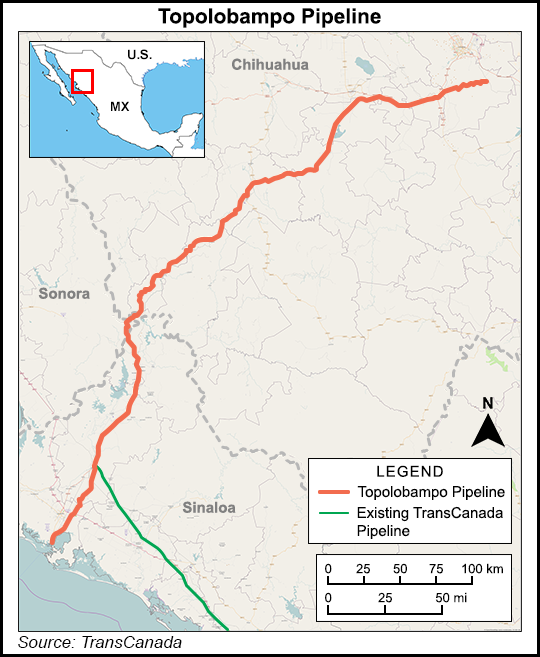Infrastructure | Mexico | NGI All News Access | NGI Mexico GPI | NGI The Weekly Gas Market Report
TransCanada Northwestern Mexico Pipeline to Be Finished This Year
TransCanada Corp.’s El Encino-Topolobampo Pipeline project in northwestern Mexico is nearly complete with the exception of a “small portion” that was delayed by negotiations with indigenous people.

With the dispute resolved, in-service is expected later this year, TransCanada spokesman Shawn Howard told NGI. TransCanada began recognizing revenue from the project last July under a force majeure provision in its 25-year contract with Mexico’s Comision Federal de Electricidad (CFE).
The pipeline interconnects with TransCanada’sMazatlán Pipeline project to create the El Encino-Mazatlán system. It “is one of the most ambitious and challenging natural gas pipeline projects in the country’s history,” TransCanada says on the project’s website.
“Due to the geographical challenges posed by crossing the Sierra Tarahumara, the project is being built using state-of-the-art technology and innovative construction techniques.
“When complete, the 560-kilometer (348-mile) 30-inch diameter pipeline will help connect the states of Chihuahua and Sinaloa, supplying numerous communities along the way.” According to TransCanada’s website, capacity is 670 MMcf/d.
The pipeline would also supply the 230 MW Topolobampo power plant as well as power plants Topolobampo II and III when they are built.
TransCanada won the $1.1 billion contract with CFE for the project in 2012.
The El Encino-Mazatlán system is composed of two parts: El Encino-Topolobampo, and El Oro-Mazatlan, which would provide 202 MMcf/d of capacity via a 30-inch diameter, 430-kilometer (267-mile) pipeline for a power plant in Mazatlan.
“The El Encino-Mazatlán system is considered as an important trigger of industrial, economic and social development of the state of Sinaloa, since it will provide access to natural gas to companies and populations in the state,” TransCanada’s website says.
© 2024 Natural Gas Intelligence. All rights reserved.
ISSN © 1532-1231 | ISSN © 2577-9877 | ISSN © 2577-9966 | ISSN © 1532-1266 |
